_login
registrieren
_5 Factories - Worker Control in Venezuela Dario Azzellini & Oliver Ressler
_ALMOSTREAL ECF
_AnArchitektur Jesko Fezer
_Arizona Road Azra Aksamija
_Balkan Konsulat rotor
_Bata-ville: We are not afraid of the future Nina Pope + Karen Guthrie / www.somewhere.org.uk
_Black Benz Race krcf in collaboration with Felix Stalder, Arben Gecaj, Faton Topalli and Osman Osmani
_Black Sea Files Ursula Biemann
_Camp La Jolla Military ParkOwen Mundy
_CHANGE REALITY: Renaming the Streets of Zagreb REINIGUNGSGESELLSCHAFT
_Conceptual Paradise. There is a place for sophistication Stefan Roemer
_de-regulation Irit Rogoff, Kutlug Ataman, Stefan Roemer

____________Bloomberg SPACE, London
____________Kumu Art Museum Tallinn
____________Open Space, Open Systems - Vienna
____________CAA 2011 Conference, New York
____________Forum Stadtpark, Graz
____________Symposium, Istanbul
____________lungomare, Bozen/Bolzano
____________Metropolis Biennale 2007-17, Copenhagen
____________new publication available now
____________Mestna Galerija, Ljubljana
____________Livestream of Networked Cultures documentary
____________
|
3 - 7 July 2005
XXII UIA World Congress, Istanbul
The 22nd congress of the International Union of Architects will take place in Istanbul
hosted by the Chamber of Architects of Turkey
from July 3 – 7, 2005
CITIES: Grand Bazaar of ArchitectureS.
Chatroom
Peter Mörtenböck & Helge Mooshammer:
Architectures of Co-Existence: Competing cultural narratives and the new contested spaces of Europe
'Bazaar' as a metaphor, accommodates both positive and negative ideas. The positive aspects are plurality, unity in diversity, competition in solidarity and festivity, while their negative counterparts point to commercialisation, commodification, fierce consumerism, and chaos. Architecture is first and foremost a cultural capital, the most tangible one, precipitating and solidly materialising in cities. If cities are the marketplace of such an invaluable resource, the need for their careful design and management is pressing. In spite of the overwhelming amount of funds allocated for the construction and rehabilitation of cities, the end result is often a low quality living/working environment due to the lack of expertise, creative thinking, and consideration for social justice.
The UIA Istanbul congress is an opportunity to review the global agenda of architecture. During past decades, the agendas of world architecture have recurrently focused on the concept of sustainable development, with cultural and bio-diversity taken as the bases of humanity. Today, against a background of natural disasters and global violence, we are ever more aware that our plural worlds are not immune to risks escalating globally on this single planet. It is this awareness of threats that affect everyone without discrimination that clusters the utopian proposals of today around the interrelated themes of ecology and democracy. The emergence of a "utopian ecological democracy" is said to be the essence of a new modernism.
The UIA 2005 Congress in Istanbul ventures to provide a platform where world architects can openly share their successes and failures, resistances and submissions, experiences and visions. With the awareness of belonging to a profession that constructs the spaces for life, architects will endeavour to establish new links with the decision makers, producers and consumers of the world’s cities.
4 July 2005, 10.20 – 11.45 am
ITU, Taskisla Campus
Chatroom
Peter Mörtenböck & Helge Mooshammer:
Architectures of Co-Existence: Competing cultural narratives and the new contested spaces of Europe
Urban space is not an isolated sphere any longer, it rather develops into a site of migratory co-existence and cross-cultural networking. Territorial boundaries are both being undermined and upheld as is the case in the recently proposed building of Austrian prisons in Rumania or the British border controls on French territory. What is at stake in this ‘bazaar of fleeting identifications and chance encounters’ is the emergence of a new way of thinking through the problematics of an increasingly illusory ‘hereness’ in relation to an equally illusory ‘thereness’.
In a major research project (Networked Cultures) THINKARCHITECTURE is currently investigating ‘expanded’ architectural practices which critically negotiate the boundaries between cultures and identities, the local and the global in favour of an aesthetics/ethics of encounter, proximity and involvement. How can such practices both reflect and generate new epistemological models and instigate cultural dialogue? Looking at the ways in which a variety of innovative architectural and art projects re-conceptualise urban co-existence through participatory forms of spatial practice, the research aims to use these phenomena to rethink the production of space and knowledge through the dynamics and effects of cultural difference. These practices from across Europe bring together its deeply fragmented cultural geography and its subjectivities in crisis with migratory trajectories and the conflicting implications of globalisation, virtualisation and digitisation.
This chat room will:
- present architectural and art practices considered in the research,
- inform about its main research instrument, an open source data base of innovative spatial practices and relational architectures in Europe (www.networkedcultures.org), and
- invite participants to develop a cartography of socio-spatial inclusion/exclusion by discussing practices which deal with the increasingly fictitious construct of ‘hereness’ and ‘thereness’. This cartography will become part of the online data base produced by the research project.
|
+ Ana Dzokic and Marc Neelen
+ Ayreen Anastas and Rene Gabri
+ atelier d'architecture autogérée (aaa)
+ Asya Filippova
+ Sophie Hope and Sarah Carrington
+ Branca Curcic
+ Christoph Schaefer
+ Campement Urbain
+ Claudia Zanfi
+ Despoina Sevasti and Poka-Yio
+ Erden Kosova
+ Helmut Batista
Radio as Spatial Practiceby: Paulo Tavares
Survival Kits: Artistic Responses to Globalizationby: Marga van Mechelen
What Ever Happened to Cultural Democracy?by: Sophie Hope
I don't know how to explain ...by: Anca Gyemant
Trading Placesby: Peter Moertenboeck & Helge Mooshammer
Milosevic as Architectby: Srdjan Jovanovic Weiss
When the Unavoidable Knocks at the Door ...by: Gulsen Bal
Tracing Translocality: The BlackBenz Raceby: Felix Stalder
travelling lexicon towards a global positioning systemby: Celine Condorelli
|
